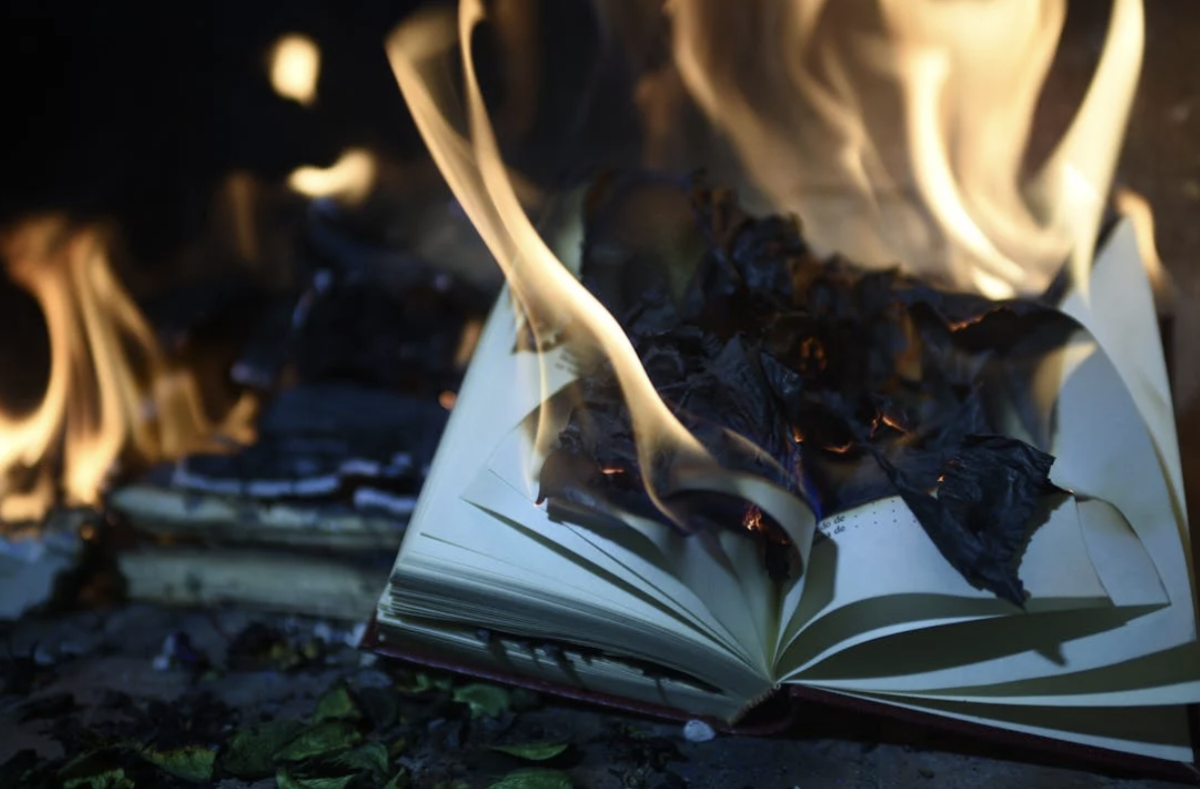
With many school districts across the country banning well-known titles, it opens the question as to how this can impact children. Photo by Patt Vielma via Pexels.
Paper burns at 451 degrees fahrenheit.
In Ray Bradbury’s novel, one that is present in numerous high school curriculums, this fact serves as a metaphor for censorship and corruption within the government. Books are lit into flames to destroy the knowledge within the pages and freedom of thought in society.
This dystopian universe depicted in Fahrenheit 451 was created 75 years ago, in 1950. But “today,” in 2025, this is quickly becoming reality for the students in America. Fahrenheit 451 is now banned in several schools across the country for containing violence and vulgar language. Ironic, isn’t it?
According to the American Library Association (ALA), book banning is “unconstitutional censorship that violates students’ First Amendment rights.” However, the banning of books is becoming a regular occurance in states across the country. Some for the way they depict the government, others for things that go against the views of the majority in the state.
We have seen books such as Harry Potter and The Chronicles of Narnia be removed from schools over the years because of the magic and witchcraft that it contains. Many disagreed with children reading about those topics due to the way it goes against some religions. As a result, parents petitioned for it to be banned.
Over the past few years, books containing political themes, sexuality, violence, and race are being removed from school libraries and ELA curriculums across America. Those who are on the side of banning the books feel as though they are teaching the “wrong things” to students in classrooms.
In the drafts of Project 2025, a Parent’s Bill of Rights was proposed which allowed for the parents of students to review books in schools and determine if they are suitable or not for their children. This bill also would exclude LQBTQ+ and books with racial topics to be spoken about during class lessons.
AP Language teacher at Cardozo, Ms. Lakhani, expressed that, “students will encounter these issues in the real world,” and, “shielding them from these topics is doing them a disservice.”
This form of censorship is occurring with books that have been in our curriculum already. For example,The Perks of Being a Wallflower by Stephen Chbosky was the summer 2023 reading assignment for all grades at Cardozo High School. At the same time, it was being banned in several schools for profanity, content of LGBTQ+, drug use, profanity, and mentions of sex.
However, junior Katie Zhang, explained that The Perks of Being a Wallflower was a, “realistic depiction of high school that I haven’t seen in any other books.” Teenagers relate to the type of content that are in many of these now banned novels, and it’s withholding their ability to be seen and heard in a way that they might not be getting from anything else.
Books are written to convey a message that can be understood not only when they’re written, but also for years to come. For centuries, literature has been a key source of knowledge for many people, especially in the formative years of school. Silencing these voices can be detrimental to the wellbeing of the student body, taking away their ability to truly relate and connect to books.
Anaiah Daniels, a high school junior explained the negative impact of this form of censorship. “Without having exposure to the ideas presented in books like these, students will struggle with forming their own opinions,” she explained.
Although there has not been any official banned books in New York City yet, thousands have been challenged. Notably, the majority of these books contained content about race and sexuality. Even though they are not banned, they are becoming more unattainable and difficult to find. With the large diversity of New York City, it’s essential for students to be able to see themselves in both their lessons and leisure reading.
As New Yorkers, we are able to join the fight against censorship as students by supporting the authors of these banned and challenged books, since they are currently available to us. The New York City Public Library has an annual “Banned Books Week” in the fall where they highlight these novels to gain support and raise awareness for this ongoing issue.
By informing ourselves, we are making sure that we can create our own opinions and navigate this world with awareness. The fight against censorship is ongoing and we need to stand up for the silenced voices to prevent a future of our knowledge being lit in flames, like in Fahrenheit 451.